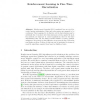163 search results - page 10 / 33 » Policy Gradient Methods for Robotics |
126
click to vote
ICANNGA
2007
Springer
15 years 8 months ago
2007
Springer
Reinforcement Learning (RL) is analyzed here as a tool for control system optimization. State and action spaces are assumed to be continuous. Time is assumed to be discrete, yet th...
115
click to vote
IROS
2006
IEEE
15 years 8 months ago
2006
IEEE
— Recently, many researchers on humanoid robotics are interested in Quasi-Passive-Dynamic Walking (Quasi-PDW) which is similar to human walking. It is desirable that control para...
116
click to vote
ICRA
2009
IEEE
15 years 9 months ago
2009
IEEE
Abstract— Least-squares policy iteration is a useful reinforcement learning method in robotics due to its computational efficiency. However, it tends to be sensitive to outliers...
139
Voted
ICRA
2010
IEEE
15 years 25 days ago
2010
IEEE
— Reinforcement learning (RL) is one of the most general approaches to learning control. Its applicability to complex motor systems, however, has been largely impossible so far d...
108
click to vote
NIPS
1990
15 years 3 months ago
1990
We present a new connectionist planning method TML90 . By interaction with an unknown environment, a world model is progressively constructed using gradient descent. For deriving ...

